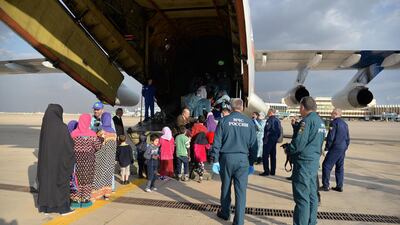While Russian President Vladimir Putin is infamous for waging ruthless campaigns against terror groups at home and abroad, his conciliatory approach to children of ISIS has fallen under the spotlight in recent weeks.
Aa part of an ongoing programme to repatriate Russian children from Iraq and Syria, 27 children arrived in Moscow by plane from Iraq earlier this month.
The question of how foreign governments should deal with citizens who joined ISIS has become more pertinent in recent months as its members slowly trickled from the group’s final stronghold in the Syrian desert following an assault by US-backed Kurdish and Arab troops, known as the Syrian Democratic Forces (SDF).
The Kremlin’s approach to ISIS children, some observers say, may offer a solution to Western governments who have so far been content to see their citizens tried in Iraqi courts or held in Kurdish detentions centers.
"This is a rare example of Russia being ahead of Western democracies on a humanitarian issue," says Ekaterina Sokirianskaia, director of the Conflict Analysis and Prevention Centre. "Russia gets to say: 'we are morally superior. We treat children as victims.'"
Russian officials working on the repatriations from Iraq say the children do not pose any security threat and that they have been encouraged to reintegrate into normal life on their arrival home.
"They attend school and kindergarten. Volunteers work with them and talk to them about what they have been through, explaining how they have been indoctrinated," Kheda Saratova, an advisor to Chechnya leader Ramzan Kadyrov, told Agence France-Presse.
The group of children who arrived in February are among an estimated 200 to have been returned since reports of the programme first appeared in state-run media in late 2017. But according to Ms Saratova, some 1,400 are still stuck in Iraq and Syria.
A majority are being returned to predominantly Muslim republics in the North Caucasus region of Russia. More than 3,000 Russian citizens, many from Chechnya and Dagestan in southern Russia, are believed to have joined armed groups in Iraq and Syria and remain there today.
Novaya Gazeta, a Russian investigative newspaper, reported earlier this month that as many as 900 Russian speakers from the North Caucasus and Central Asia are holed up in Idlib in northwestern Syria, the last stronghold of rebel opposition to President Bashar Assad.
Until December last year, when 30 more children were returned, the program – which originally included women as well as children – was put on hold for nearly a year over what analysts said was a disagreement within the government over security concerns.
Alexander Bortnikov, the head of Russia’s FSB intelligence service, noted last year that many women with children exiting conflict zones have been used by militants as suicide bombers or recruiters.
Mr Putin, however, has argued that the children are not responsible and that the Russian authorities have “no right” to leave them in Iraq and Syria.
In late 2017, the Russian president described efforts to return children as “a very honourable and correct deed”.
For Ramzan Kadyrov, the strongman leader of the Chechen republic credited with kick-starting the programme, saving women and children serves as a welcome opportunity to rebrand his image as a ruthless authoritarian.
“It's very good for the image of Kadyrov. He seems somebody who doesn't just use violence against terrorists but who builds mosques and hands out humanitarian aid,” Grigory Shvedov, who edits a Caucasus-focused news website Caucasian Knot, told AFP.
However, bringing the children back to Russia gives the authorities – and Mr Kadyrov in particular – greater control over what might otherwise be turned into a new generation of militants, according to Ms Sokirianskaia.
For Mr Kadyrov, "any Chechen out of his control is a potentially dangerous Chechen," she says.

